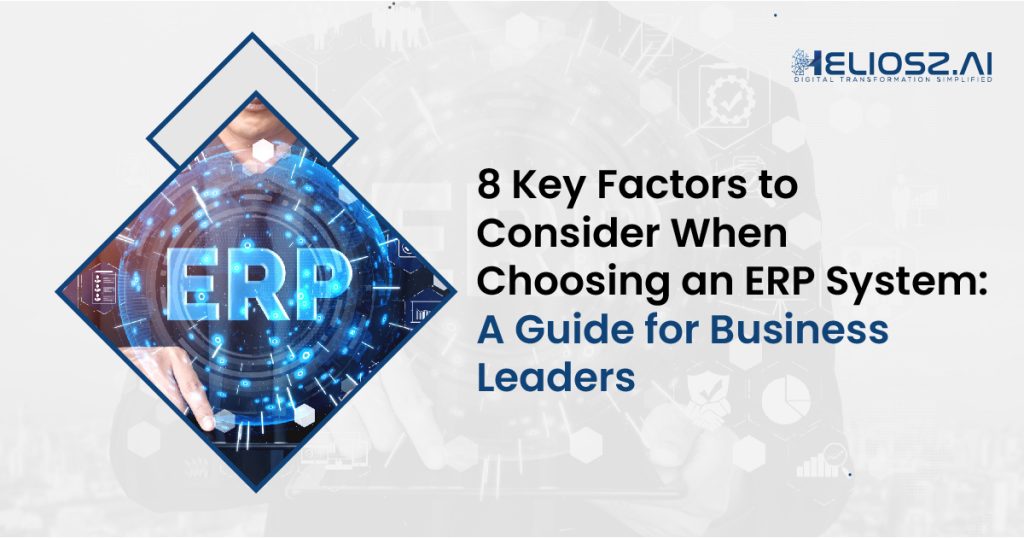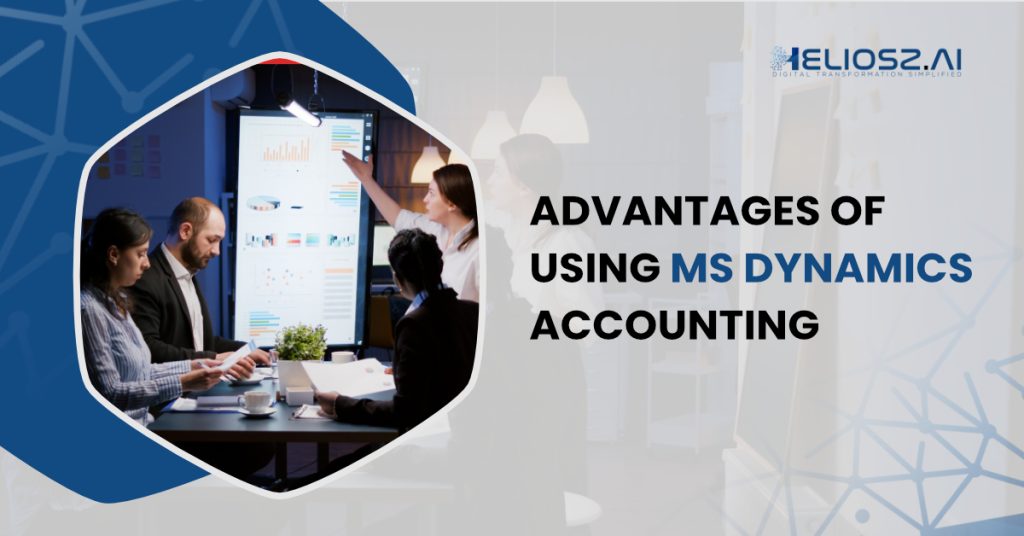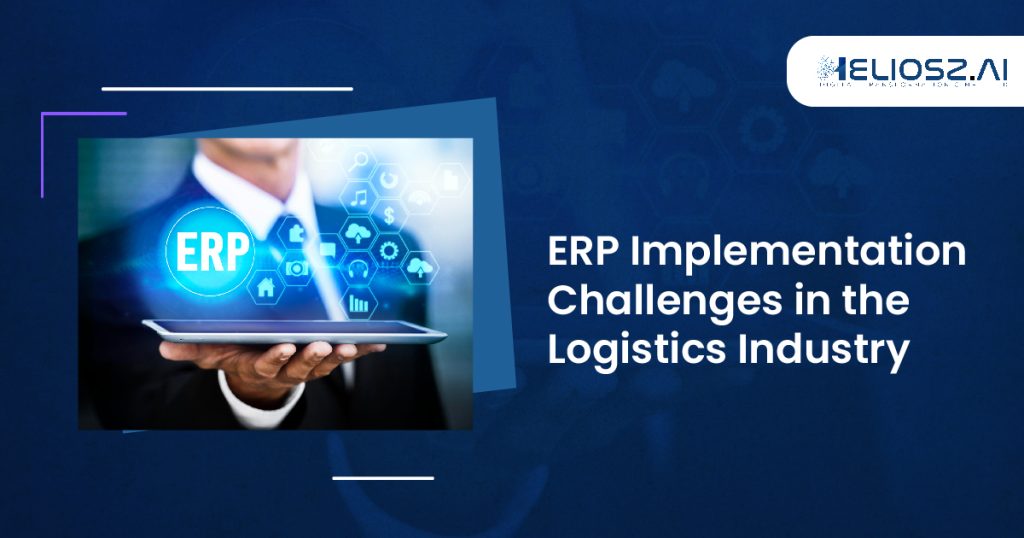
An ERP system is what the success of every business relies upon. It is the means of streamlining business processes, maximizing efficiency, and supporting growth. However, a poor choice will definitely waste resources and create operational difficulties. Therefore, business leaders face a wide variety of choices for selecting an ERP system that serves their best interest. To determine the key areas to be addressed, you’ll be better prepared when choosing the best ERP system.
This article explores eight key factors business leaders should consider when choosing an ERP system. Each is crafted to guide you in making a more informed decision that is suited to your company’s needs, goals, and future growth.
What is ERP? A Comprehensive Definition
Enterprise Resource Planning is an application integrating and controlling such essential business activities as finance, inventory, human resources, procurement, and supply chain management. It allows the information from all departments to be on one platform so that access is real-time and, therefore, improves decision making because of smooth operation. ERP systems have automated and optimized workflows to make businesses maximize their efficiency, cut costs, and improve overall performance. It provides a single point of access to manage every aspect of an organization’s business.
Top 8 ERP Selection Criteria
ERP Selection Criteria 1: Understand Your Business Requirements
Before finalizing an ERP system, you must identify the needs of your business. This initial step helps you ensure that the system chosen by you serves not only the current needs but also the future strategic requirements.
a) Reviewing Current Processes and Pain Points
Take a good look at current workflows. Focus on bottlenecks, areas of inefficiency, and pain points. Chances are high that you can identify manual labor, siloed departments, or poor visibility into operations which will get you to better prioritize the types of features you need within an ERP.
b) Determine what you want: What do I need to obtain with an ERP?
Your tool should not be a simple implementation of existing but rather help yield measurable improvements: better inventory, financial reporting to management, quicker service to a customer, higher productivity for employee groups? Such definitions will certainly help you arrive at the perfect system.
c) Industry-specific requirements: A solution tailored to the industry
Some industries may also have specific needs, such as manufacturing, healthcare, or retail, which cannot be met by an off-the-shelf ERP solution. Look for ERP with industry-specific features or multiple modules for customization according to your business requirements.
ERP Selection Criteria 2: Scalability and Future Growth
As your business grows, so do the requirements of ERP. The proper selection of ERP is critical and can be easily scaled with business to avoid any costly system overhaul in the near future.
a) Expansion Planning: Does ERP grow with the Business?
It should scale as your company grows. Whether opening new locations, hiring more employees, or entering new markets, the ERP system should be able to handle the increased demands without compromising on performance.
b) Modular vs. Comprehensive Solutions: Which is Right for You?
Some ERP systems offer modular solutions, so you can implement only those features needed today and add more functionality later. If you see potential changes occurring in your business operations or anticipate significant growth, then a modular solution might be the best choice; otherwise, a complete solution could be much more efficient if your business needs all-in-one functionality from day one.
ERP Selection Criteria 3: Integration Capabilities
The new ERP system must also integrate easily with your current software and infrastructure. Poor integration results in inconsistencies, redundant work, and inefficiencies that can nullify the entire purpose of using an ERP system.
a) Connecting with Existing Systems: Avoiding Silos
If you are using other software applications, for instance, CRM or the supply chain management system, choose an ERP system that will support easy integration into these. An integrated system tends to ensure consistent practices within and between departments to avoid siloing data.
b) Availability of APIs: Seamless Interoperability
For maximum flexibility, look for ERP systems that provide robust APIs (Application Programming Interfaces). These APIs will allow easy integration with third-party tools, allowing your system to evolve and adapt as new technologies emerge.
c) Compatibility with Future Technologies
The more advanced the technology is, the more the ERP should be. Seek systems that can keep up with such evolving technologies, such as AI, machine learning, and Internet of Things or IoT, which will future proof your ERP in making sure that it keeps track with your business, its growth, and adopted trends.
ERP Selection Criteria 4: Customization and Flexibility
Each business is different, and your ERP system needs to be flexible enough to be able to capture those nuances without losing its core functionality.
a) Adapting to Unique Business Workflows
Choose an ERP that can be customized to fit your company’s workflows. That could mean custom fields, reports, or dashboards. Customization means the system is adapting to how your business operates, not the other way around.
b) Balancing Customization with Standardization
While customization is essential, standardization should be equally important. Over-customizing makes it difficult to upgrade your system in the future, and thus maintenance costs may increase with possible functionality issues. Be cautious about customizing only the aspects that differentiate your business.
c) Avoiding Over-Customization Pitfalls
Be cautious when it comes to customization. While adding unique features may seem attractive, over-customization may make the system complicated, costly, and hard to update. Focus on only those changes that help grow the business without overwhelming the system.
ERP Selection Criteria 5: User Experience and Accessibility
A user-friendly ERP system drives adoption across your organization and will help maximize its potential. If it is too complicated or inaccessible, it will limit productivity and potentially be abandoned by employees.
a) Ease of Use: Training and Adoption Across Teams
When selecting the best ERP systems, one should consider, among other things, the UI, which will easily allow employees to navigate. A system that is intuitive and simple to learn minimizes training time and enhances adoption rates. The use of ERP systems with user-friendly dashboards and simple workflows makes it easy to work effectively even in mobile and remote access environments.
b) Dashboard and reporting features for improved insights
The third important benefit an ERP system offers is effective reporting. The system should allow customizable dashboards and advanced reporting features that the leader would be able to come up with insights into critical metrics like sales performance, inventory levels, and financial health.
ERP Selection Criteria 6: Vendor Reputation and Support
Your ERP system will be a long-term investment, so it’s important to choose a vendor that is reliable and provides excellent customer support.
a) Researching Vendor Credibility and Market Presence
Before selecting an ERP vendor, research their market reputation. Find out reviews, testimonials, and case studies from other businesses similar to yours. The greater the confidence will be with an established vendor having a proven track record.
b) Support and Training Services
The best ERP providers offer comprehensive services, including the provision of appropriate training, technical support, and troubleshooting. Try to find the vendor that ensures both on-site and online help, as well as user guidebooks and interactive tutorials.
c) Assessing Long-Term Vendor Commitment
The success of your ERP implementation will largely depend on the commitment of the vendor for long-term support and software updates. Make sure the vendor has a good roadmap for future update and improvement of the system and good proactive customer service to deal with challenges.
ERP Selection Criteria 7: Total Cost of Ownership
TCO is more of a cost over time rather than a price to the pocket. Now, the initiation cost of ERP is important and not the major concern. Let’s understand through an example regarding the full picture of costs on an ERP system that will benefit you in more informed decision making.
a) Initial vs. Ongoing Costs
The cost of an ERP system should not only be the licensing or subscription fees but also the costs of implementation, training, and additional hardware or infrastructure needed. All these will add to the cost of maintaining it, including upgrades and support fees.
b) Understanding Licensing Models: Perpetual vs. Subscription
ERP vendors usually offer two types of licensing models: perpetual and subscription based. The perpetual license will demand a huge upfront payment, whereas the subscription model spreads it over time. Determine which option is more appropriate for your company’s cash flow and long-term financial planning.
c) Calculating ROI: Measuring ERP’s Value Over Time
Analyze if the investment in an ERP system is worthwhile by calculating its return on investment (ROI). Calculate all potential time savings and savings in resources along with any resultant efficiency gains against the total cost of ownership. It should pay for itself through successful implementation over time.
ERP Selection Criteria 8: Data Security and Compliance
ERP usually contains sensitive business information, including financial, customer information, and inventory counts. This kind of data must be secure and compliant with rules; hence, this is a strict requirement when one is choosing an ERP.
a) Secure Business Data: Key Security Features
The ERP system should be delivered with strong security features, including data encryption, multi-factor authentication, and role-based access controls. These will help protect your business’s sensitive data from cyber threats and unauthorized access.
b) Compliance with Industry Regulations and Standards
Depending on your industry, your business may need to follow specific regulations such as GDPR, HIPAA, or SOX. Ensure that the ERP system complies with all compliance requirements and that the vendor is committed to maintaining security standards.
c) Backup and Disaster Recovery Capabilities
Data loss is catastrophic for any business. Hence, an ERP system with good backup and disaster recovery capabilities is necessary. It should be able to back up data regularly and offer options for quick recovery in case of system failure.
Final Thoughts
Choosing the right ERP system is the most important decision in your business, as it maximizes operations with the right solution, enhances productivity, and further drives growth. However, benefits can only be fully realized after considering business needs, scalability, integration, customization, user experience, vendor reputation, cost, data security, and a clear implementation plan.
Now, It’s Time for Heliosz! Achieve ERP Excellence with Us
While the selection process may be intimidating, the right ERP implementation experts will make all the difference. Heliosz.AI specializes in seamless ERP system implementations tailored to your unique business requirements. Their team of experts ensures that your system is fully integrated, scalable, and optimized for long-term success.
For businesses looking to streamline their processes and enhance operational efficiency, partnering with Heliosz.AI for your ERP implementation project is a smart and strategic choice. Let Heliosz.AI help you unlock the full potential of your ERP system, ensuring a smooth, effective, and future-proof solution that drives your business forward.


